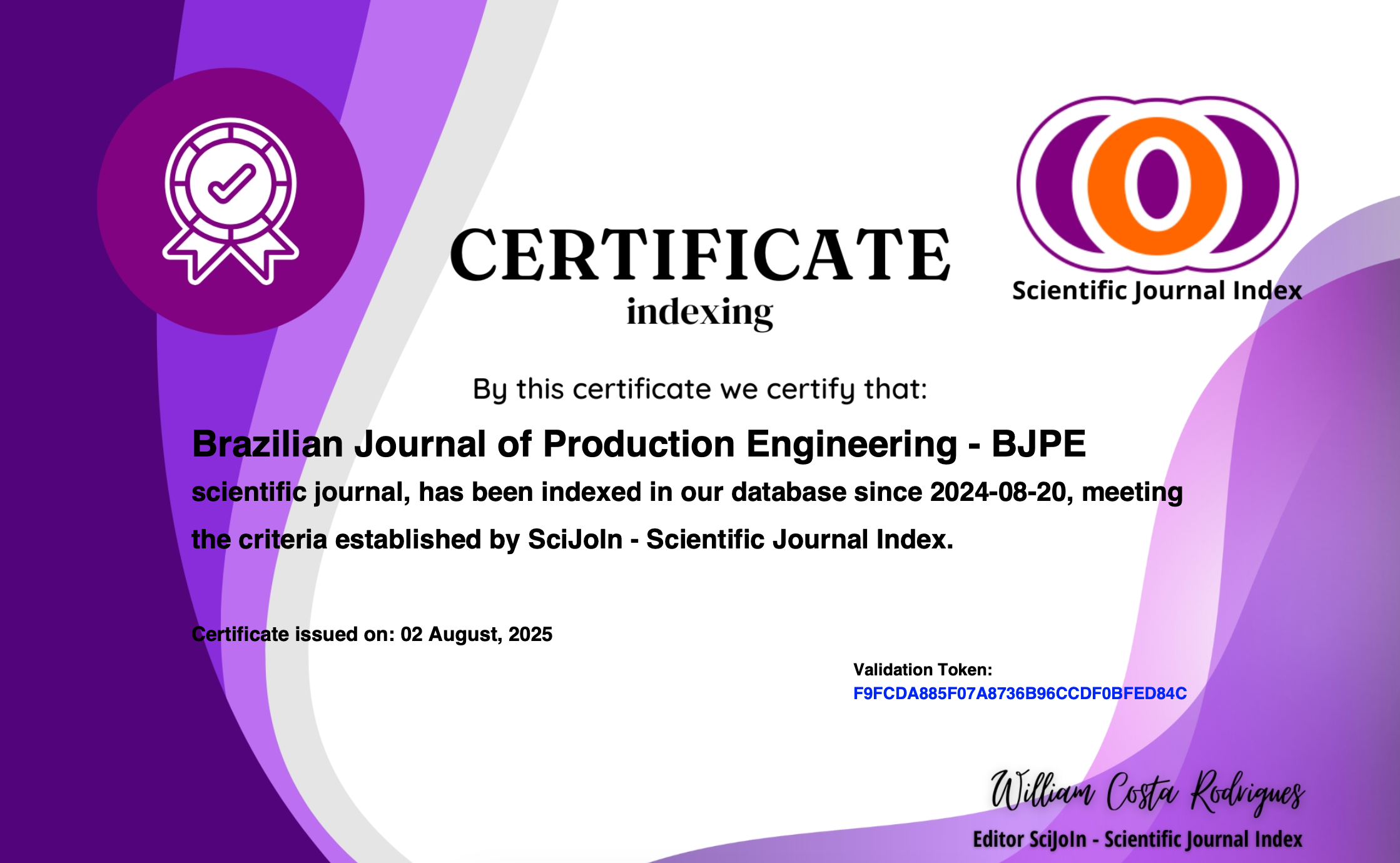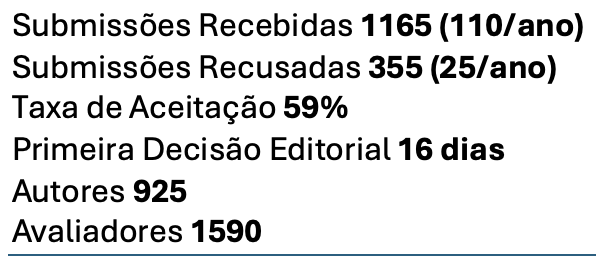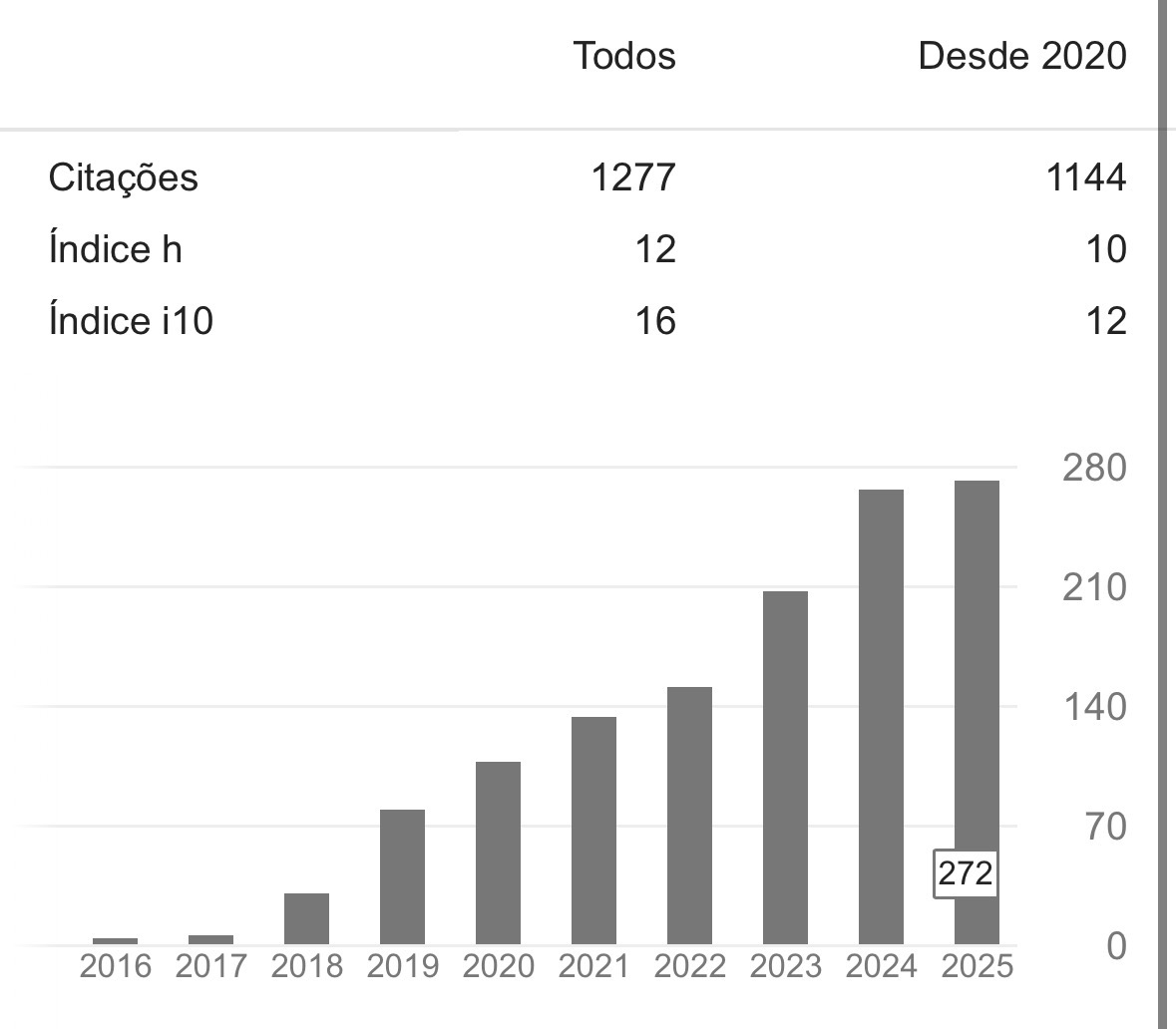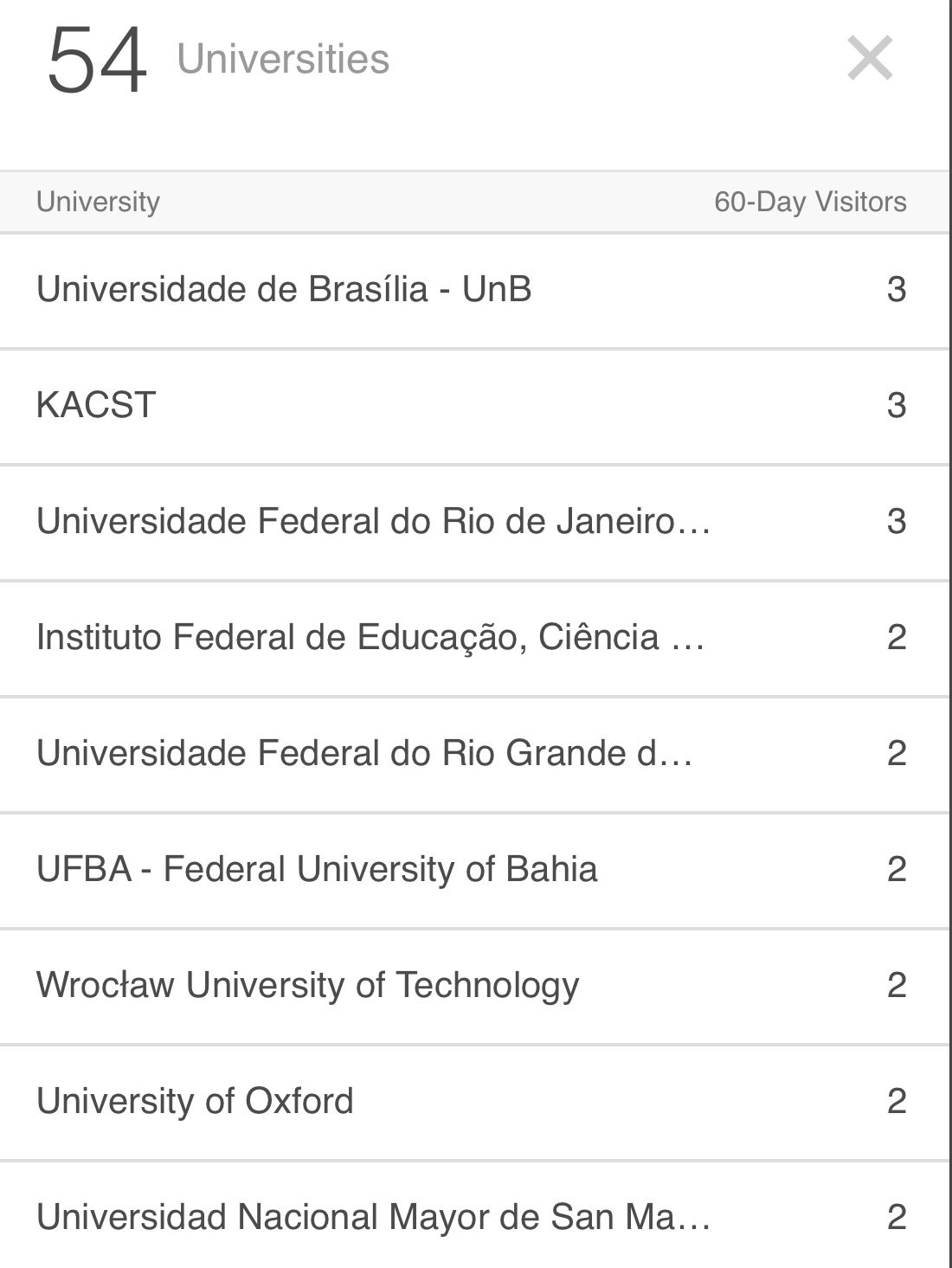Análise de eficiência do desenvolvimento sustentável do brasil e dos países da OCDE
DOI:
https://doi.org/10.47456/bjpe.v7i5.36133Palavras-chave:
Indicadores de sustentabilidade, DEA, Desenvolvimento sustentável, OCDE, BrasilResumo
O desenvolvimento de um país não está relacionado apenas ao seu crescimento econômico, uma vez que seu desenvolvimento sustentável deve considerar aspectos sociais, econômicos e ambientais. Este trabalho pretende medir e analisar a eficiência do Brasil e dos países da OCDE (Organização para o Desenvolvimento Econômico e de Cooperação) sob o ponto de vista do desenvolvimento sustentável, visto a atual ambição do Brasil em compor a OCDE. Esta análise utilizou um método de programação matemática denominado Análise Envoltória de Dados (DEA), que permitiu, a partir do modelo SBM e da análise de janelas, avaliar a capacidade dos países de reduzir os inputs (emissão de CO2, consumo de energia, taxa de desemprego e índice de Gini), bem como aumentar os outputs (expectativa de vida, PIB, energia sustentável, saneamento básico). A comparação entre os países foi feita a partir do ranking de eficiência sustentável e os resultados deste estudo indicaram que a Letônia e o Chile são os mais eficientes; e em quarto lugar está o Brasil. Além disso, foram analisadas as folgas relativas e concluiu-se que, embora o Brasil não seja benchmark em nenhuma variável, suas folgas são relativamente baixas. Ressalta-se que o índice medido é importante para contribuir nas discussões relacionadas à avaliação da sustentabilidade dos países, ajudando a identificar aqueles com as melhores práticas no que diz respeito a aspectos sociais, econômicos e ambientais; e orientar as decisões políticas relativas aos incentivos governamentais para promover o desenvolvimento dos países em busca de uma produção mais sustentável.
Downloads
Referências
Agenda 21 Global (1992). Integração entre meio ambiente e desenvolvimento na tomada de decisões. p.4. Rio de Janeiro. Retrieved from http://www.mma.gov.br/estruturas/agenda21/_arquivos/cap08.pdf
Apergis, N., & Payne, J. E. (2010) Renewable energy consumption and economic growth: Evidence from a panel of OECD countries. Energy Policy. 38, 656-660, ISSN 0301-4215, https://doi.org/10.1016/j.enpol.2009.09.002
Arndt, C., Arent, D., Hartley, F., Merven, B., & Mondal, A. H. (2019). Faster Than You Think: Renewable Energy and Developing Countries Annual Review of Resource Economics. 11(1), 149-168. Retrieved from https://www.annualreviews.org/doi/abs/10.1146/annurev-resource-100518-093759
Azar, C., Holmberg, J., & Lindgre, K. (1996) Social-ecological indicators for sustainability. Ecological Economics, 18, 89-11.
BNEF. (2015). Global Trends in Renewable Energy Investment 2015. Frankfurt am Main: Bloomberg New Energy Finance/Frankfurt School/UNEP Centre.
Bossel, H. (1997). Deriving indicators of sustainable development. Environmental Modeling and Assessment, 1, 193-218.
Camioto, F. C., Mariano, E. B., Santana, N. B., Yamashita, B. D., & Rebelatto, D. A. (2018). Renewable and Sustainable Energy Efficiency: An Analysis of Latin American Countries. Environmental Progress & Sustainable Energy. 37(6). https://doi.org/10.1002/ep.12877
Charnes, A., Cooper, W. W., Lewin, A. Y., & Seiford, L. M. (1994). Date Envelopment Analysis. Theory, Methodology and Applications. Springer Science & Business Media.
Coelli, T. J. et al. (2005). An Introduction to efficiency and productivity analysis. Ed. 2.
Cooper, W. W., Seiford, L. M., & Tone, K. (2006). Introduction to data envelopment analysis and its uses: with DEA-solver software and references. Springer Science & Business Media.
Dhahri, S., & Omri, A. (2018). Entrepreneurship contribution to the three pillars of sustainable development: What does the evidence really say? World Development, 106, 64-77.
Elkington, J. (1997). Cannibals with Forks: The Triple Bottom Line of Twenty-First Century Business. Oxford: Capstone Publishing Ltd.
Endenhofer, O. et al. (2008). Climate Change 2014: Mitigation of Climate Change, Contribution of Working Group III to the Fifth Assessment Report of the Intergovernmental Panel on Climate Change. Cambridge University Press. United Kingdom/ New York.
Gaspar, J. S., Marques, A. C., & Fuinhas, J. A. (2017) The traditional energy-growth nexus: A comparison between sustainable development and economic growth approaches. Ecological Indicators, 75, 286-296.
Jabbour, C. J. C., & Santos, F.C.A. (2009) Sob os ventos da mudança climática: desafios, oportunidades e o papel da função produção no contexto do aquecimento global. Gest. Prod., 6(1), 111-120.
Luukkanen, J. et al. (2019). Green economic development in Lao PDR: A Sustainability Window analysis of Green Growth Productivity and the Efficiency Gap, Journal of Cleaner Production, 211, 818-829.
Megyesiova, S, & Lieskovska, V. (2018). Analysis of the Sustainable Development Indicators in the OECD Countries. Sustainability, 10, https://doi.org/10.3390/su10124554
Minh, H., V., & Nguyen-Viet, H. (2011). Economic Aspects of Sanitation in Developing Countries. Environmental Health Insights. 5, 63-70. https://dx.doi.org/10.4137%2FEHI.S8199
Nações Unidas no Brasil. (2015). Transformando Nosso Mundo: A Agenda 2030 para o Desenvolvimento Sustentável. Retrieved from https://nacoesunidas.org/pos2015/agenda2030/
OECD. (2006). Good Practices in the National Development Sustainable Development Strategies of OECD countries. Paris. http://www.oecd.org/greengrowth/36655769.pdf
OECD. (2018). OECD Economic Surveys: Chile 2018, OECD Publishing, Paris. http://dx.doi.org/10.1787/eco_serveys-chl-2018-en
OECD. (2019). OECD Environmental Performance Reviews: Latvia 2019, OECD Environmental Performance Reviews, OECD Publishing, Paris. https://doi.org/10.1787/2cb03cdd-en
OECD. (2018). OECD Environmental Performance Reviews: Brazil 2018, OECD Environmental Performance Reviews, OECD Publishing, Paris. https://doi.org/10.1787/2cb03cdd-en
OECD. (2016). OECD Environmental Performance Reviews: Chile 2016, OECD Environmental Performance Reviews, OECD Publishing, Paris. https://doi.org/10.1787/9789264252615-en
Penedo, A. S. T., et al. (2016). International socio-environmental conferences and agreements: a thematic review. Revista em Agronegócio e Meio Ambiente, Maringá, 9(3).
Rashidi, K., Shabani, A., & Saen, R. F. (2015). Using data envelopment analysis for estimating energy saving and undesirable output abatement: a case study in the Organization for Economic Co-Operation and Development (OECD) countries. Journal of Cleaner Production. 105, 441- 252.
Santana, N. B., Mariano, E. B., Camioto, F. C., & Rebelatto, D. A. N. (2015). National innovative capacity as determinant in sustainable development: a comparison between the BRICS and G7 countries. Int. J. Innovation and Sustainable Development. 9 (3-4).
Sebastian, J., & Sebastian, W. (2016). Financial development and income inequality: a panel data approach. Empirical Economics, 51, 291-314.
Shafiei, S., & Salim, R. (2014). Non-renewable and renewable energy consumption and CO2 emissions in OECD countries: A comparative analysis. Energy Policy. 6, 547-556. http://dx.doi.org/10.1016/j.enpol.2013.10.064
Shen, Z., Boussemart, J., & Leleu, H. (2017). Aggregate green productivity growth in OECD’s countries. Int. J. Production Economics. 189, 30-39.
Song, M. L., Zhang, L. L., Liu, W., & Fisher, R. (2013). Bootstrap-DEA analysis of BRICS' energy efficiency based on small sample data. Appl. Energy. 112, 1049-1055
Sustainable Development. (2015). The 17 sustainable development goals. Retrieved from https://www.un.org/sustainabledevelopment/sustainable-development-goals/
Szopik, K. et al. (2018). The study of relationship in a hierarchical structure of EU sustainable development indicators. Ecological Indicators, 90, 120-131.
Thévenot, C. (2017). Inequality in OECD countries. Scandinavian Journal of Public Health. 45, 9-16. Retrieved from https://journals.sagepub.com/action/doSearch?target=default&ContribAuthorStored=Th%C3%A9venot%2C+Celine
Tone, K. (2001). A slacks-based measure of efficiency in data envelopment analysis. European Journal of Operational Research, 130(3), 498-509.
Tuon, L. (2020). O que falta para o Brasil entrar nos padrões da OCDE, o “clube dos ricos”. Exame. 18 jan. 2020. Retrieved from https://exame.abril.com.br/economia/o-que-falta-para-o-brasil-entrar-nos-padroes-da-ocde-o-clube-dos-ricos/
UN General Assembly. (2005). World Summit Outcome: resolution / adopted by the General Assembly. A/RES/60/1, 2005. Retrieved from https://www.refworld.org/docid/44168a910.html
United Nations. (1987). Our common future: World Commission on Environment and Development. Oxford University Press. Retrieved from https://sustainabledevelopment.un.org/content/documents/5987our-common-future.pdf
United Nations. (2012). The future we want: Outcome document of the United Nations Conference on Sustainable Development. Rio de janeiro. Retrieved from https://sustainabledevelopment.un.org/content/documents/733FutureWeWant.pdf
Van Bellen, H. M. (2002). Indicadores de Sustentabilidade: Uma Análise Comparativa. 2002. 235f. Tese de Doutorado em Engenharia de Produção, Universidade Federal de Santa Catarina, Florianópolis.
Wang, K., Lu, B., & Wey, Y.M. (2013). China's regional energy and environmental efficiency: arrange-adjusted measure-based analysis. Applied Energy. 112, 1403-1415. Retrieved from https://www.researchgate.net/deref/http%3A%2F%2Fdx.doi.org%2F10.1016%2Fj.apenergy.2013.04.021
Wang, Y. M, & Chin, K. S. (2010). Some alternative models for DEA cross-efficiency evaluation. Int. J. Production Economics. 128, 332- 338.
Wilson, J. P. (2014). The triple bottom line Undertaking an economic, social, and environmental retail sustainability strategy. International Journal of Retail & Distribution Management. 45(4/5), 432-447.
World Bank. (2020). World Development Indicators. 2020. Retrieved from http://datatopics.worldbank.org/world-development-indicators/
Xie, B, C., Bai, C., Shang, L.-F., Yang, S.-B., & Yi, B. W. (2014). Dynamic environmental efficiencyevaluation of electric power industries: evidence from OECD (Organization for Economic Cooperation and Development) and BRIC (Brazil, Russia, India and China) countries. Energy, 74, 147–157.
Zafar, M, W., Shabaz, M., Sinha, A., Sengupta, T., & Qin, Q. (2020). How renewable Energy Consumption Contribute to Environmental Quality? The Role of Education in OECD Countries. Journal of Cleaner Production. 268, 2020.
Zhou, H., Yang, Y., Chen, Y., & Zhu, J. (2018). Date envelopment analysis application in sustainability: The origins, development and future directions. European Journal of Operational Research. 264, 1-16.
Zhou, P., Ang, B. W. (2008). Linear programming models for measuring economy-wide energy efficiency performance. Energy Policy. 36, 2911-2916.
Downloads
Publicado
Edição
Seção
Licença
Copyright (c) 2021 Flávia de Castro Camioto, Isadora Avemir Damaceno Rodrigues (Autor)

Este trabalho está licenciado sob uma licença Creative Commons Attribution 4.0 International License.

Todos os trabalhos publicados na Brazilian Journal of Production Engineering (BJPE) estão licenciados sob a Creative Commons Atribuição 4.0 Internacional (CC BY 4.0).
Isso significa que:
-
Qualquer pessoa pode copiar, distribuir, exibir, adaptar, remixar e até utilizar comercialmente os conteúdos publicados na revista;
-
Desde que sejam atribuídos os devidos créditos aos autores e à BJPE como fonte original;
-
Não é exigida permissão adicional para reutilização, desde que respeitados os termos da licença.
Esta política está em conformidade com os princípios do acesso aberto, promovendo a ampla disseminação do conhecimento científico.



2.png)


























































